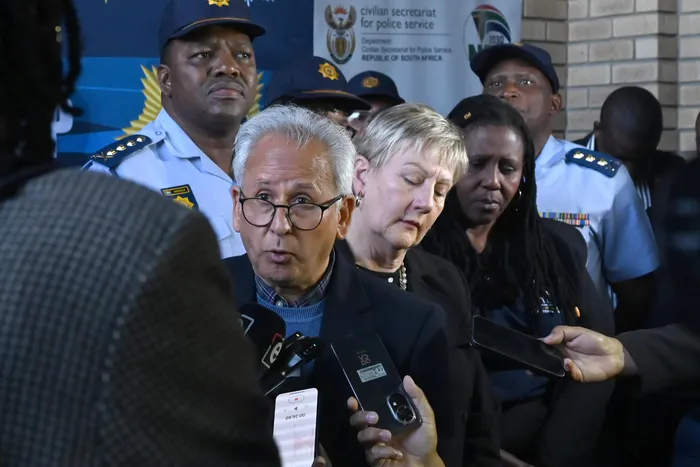Devolution of SAPS powers is a matter of life and death

Acting Police Minister Professor Firoz Cachalia addresses the media at the Mfuleni police station. The Western Cape, plagued by gang violence, is serviced by just 12,908 active officers, which translates to a vacancy rate of over 12%, says the author.
Image: Ayanda Ndamane/ Independent Media
MANENBERG, Hanover Park, Delft, Mitchells Plain, and Nyanga, to name a few, are areas that have become battlegrounds, and they are stained with the blood of our people.
Since January of this year, over 2,000 people have been shot in the Western Cape. That is nearly 13 lives shattered every single day.
Children cannot walk to school without fearing for their lives. Mothers, grandmothers, and ordinary citizens patrol the streets in reflective vests because they’ve long since given up on the idea that the National Government, with whom the policing mandate lies, will protect them. This is the result of a collapse of governance.
We can no longer ignore the painful truth: SAPS is failing us. The South African Police Service is under-trained, under-resourced, and weighed down by political infighting.
Detective units are drowning under dockets, with months-long delays in forensic testing, and criminal investigations ground to a halt because of systemic inefficiencies. Illegal firearms circulate freely on our streets because conviction rates for possession of illegal firearms sit at an appalling 5%. Local law enforcement units have been able to confiscate over 1,670 illegal firearms since 2021, but these arrests are rendered unfruitful because of SAPS’s failure to follow through with effective investigations. Half of these cases never even make it to court.
What remains of the gang units? They are chronically underfunded, their vehicles are broken, and staff morale is lower than it has ever been. Firearms flood across borders, entering from corrupt supply chains, even from our own state arms procurement agency, Armscor. But when it comes to recovering these firearms, the response is sporadic and poorly coordinated.
And it does not stop with policing. Our parole system is just as broken.
In areas like Delft and Elsies River, more than 36% of parolees reoffend, returning to the very gangs they once operated with. Between February 2024 and February 2025, over 2,395 parolees were released in the Cape Flats, and 254 of them reoffended within just a year.
Our prisons have long ceased to serve as places of rehabilitation. They are nothing more than gang-run warehouses, recruitment centres for future violence. Parole boards, more concerned with overcrowding than rehabilitation, continue to release criminals back onto the streets without proper monitoring, allowing these offenders to return to their gang networks almost immediately.
This is not a failing system. This is a system that has already failed.
This systemic rot is compounded by an alarming shortage of SAPS officers. The Western Cape, plagued by gang violence, is serviced by just 12,908 active officers, which translates to a vacancy rate of over 12%. Some precincts face vacancy rates of over 40%. Detectives are overwhelmed, each carrying up to 142 case dockets, dragging the province’s murder detection rate down to a mere 7%.
At 14 police precincts in the Western Cape, detectives manage over 200 case dockets each. The system is beyond capacity. The failure is systemic. The situation is unsustainable, and communities are paying the price.
For years, the Western Cape Government and City of Cape Town have called for policing powers to be devolved to capable provincial and local governments. And for years, the national government – led by the ANC – has resisted. Why? Because power matters more to them than the people they were elected to serve. Every time the DA-led Western Cape tries to build viable alternatives, the ANC blocks and undermines them – not because it has a better plan, but simply to maintain control.
Enough is enough.
If the national government cannot or will not fix SAPS, then it must step aside. The Western Cape must be given the power and budget to take control of its own safety. The case for devolution is no longer a matter of politics; it is a matter of life and death.
Here is the path forward:
- Devolve policing powers: Let the province build its own well-funded, intelligence-led anti-gang and firearm units.
- Empower local governments to take charge of detection and forensic services: Arrests should lead to convictions, not technical failures and systemic incompetence.
- Reform parole: Implement risk assessments for violent offenders, ensure no early release for gang members without proper rehabilitation, and provide real post-release monitoring.
- Fix our prisons: Break the stranglehold of gang control, introduce genuine skills training, and ensure proper searches of returning inmates – starting with Pollsmoor Prison.
- Invest in community-based safety: Bolster neighbourhood structures already stepping in where the government falls short.
We are past the point of debate. The bloodshed is relentless. Children are terrified. Families are in constant fear. And we are being asked to wait – for forensic results, for justice, for safety. How many more innocent lives must be lost before we act?
If the national government continues to play politics with our lives, then the Western Cape must take matters into its own hands – not in defiance, but in defence. In defence of our children. In defence of our communities. In defence of the Constitution, which guarantees safety, security, and dignity for every citizen.
We need real change. We need functional policing. And we need it here, in the province, close to the people it is meant to protect. Because the bullets are flying now. And the time for action is not tomorrow. It is today.
Van Minnen is the Chairperson of the Standing Committee on Police Oversight and Community Safety ,Cultural Affairs and Sport in the Western Cape Provincial Parliament.